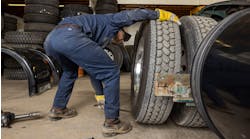Colorado Senate Committee approved comprehensive legislation recently to reform the state’s scrap tire laws. More than 60 million stockpiled scrap tires are in Colorado -- one of the few states where piles are growing.
The Rubber Manufacturers Association (RMA) has been working to change Colorado’s scrap tire law since the last changes were made to the program several years ago. RMA testified in favor of the legislation this week.
HB 1018, which passed the House in March, was unanimously approved by the Colorado Senate Transportation Committee. The measure will next be considered by the Senate Finance Committee.
“HB 1018 is the result of eight months of negotiation among all major scrap tire stakeholders in Colorado,” says Michael Blumenthal, RMA vice president, who testified in support of HB 1018. “If enacted, Colorado will be able to address some of the gaps in their program, while focusing on market development and continued stockpile abatement.”
Colorado currently imposes a $1.50 fee on new tires that should be used for enforcement of state scrap tire regulations, cleanup of waste tire piles and market development.
“Unfortunately, Colorado has not effectively managed scrap tires,” Blumenthal says. “The state has the greatest number of tires in stockpiles in the nation, and unless the system is changed, those piles will continue to grow.”
HB 1018 would:
* Place more of the scrap tire funds directly into scrap tire activities.
* Consolidate all waste tire programs under the Colorado Department of Public Health and Environment (CDPHE) and establishes new requirements for scrap tire market development, fire planning and prevention, waste tire hauler regulations, and waste tire facility regulations.
* Create regulations that will benefit the state and the scrap tire industry, close gaps in the regulation that will decrease the incidence of unlawful dumping of tires.
* Create an advisory committee that can provide on going review and evaluation of the program that will increase the likelihood of constant improvement to the program.
“We will continue to press Colorado lawmakers to enact this legislation,” Blumenthal says. “The measure is long overdue and urgently needed. We are grateful to the House and Senate sponsors of this legislation and will work with them to see this bill enacted.”


